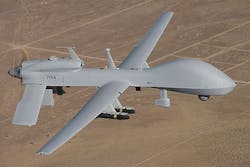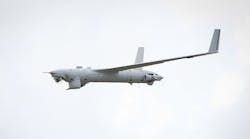Officials of the Army Contracting Command at Redstone Arsenal, Ala., are ordering the 19 unmanned aircraft from General Atomics, as well as 19 satellite communications (SATCOM) air data terminals, one lot of spare parts, and one lot of ground support equipment.
The General Atomics MQ-1C Gray Eagle unmanned aerial vehicle (UAV) is a medium altitude long endurance (MALE) unmanned aircraft that is an upgraded MQ-1 Predator as an extended-range multi-purpose UAV. The aircraft can be fitted with the AGM-114 Hellfire missile or GBU-44/B Viper Strike guided bomb for attack missions.
The Gray Eagle UAV has a synthetic aperture radar/ground moving target indicator (SAR-GMTI) system, and targeting capability from an AN/AAS-52 multi-spectral targeting system (MTS) under the nose. The aircraft can carry a payload of 800 pounds.
The MQ-1C Gray Eagle provides reconnaissance, surveillance, and target Acquisition; command and control; communications relay; signals intelligence; electronic warfare; attack; detection of weapons of mass destruction; battle damage assessment; and manned and unmanned teaming capabilities.
Related: Army to build special UAV airport at Fort Bliss for Grey Eagle and Shadow unmanned aircraft
The Gray Eagle UAV provides Army division commanders with tactical fight capabilities for battlefield reconnaissance and air-to-ground attack. They are attached to the combat aviation brigade in each division.
In each division the Gray Eagle UAVs support the division fires, battlefield surveillance brigades, brigade combat teams, Army Special Operations forces, and aerial exploitation battalions.
Compared with its predecessor, the MQ-1 Predator, the Gray Eagle has an increased wingspan than the Predator, and is powered by a Thielert Centurion 1.7 heavy fuel engine (HFE) able to burn jet and diesel fuel. It can fly for as long as 36 hours at altitudes to 25,000 feet. It has an operating range of 200 nautical miles.
The UAV is 28 feet long, has a wingspan of 56 feet, and is nearly seven feet high. The unmanned aircraft, which also uses the Northrop Grumman AN/ZPY-1 STARLite radar system, first flew in 2004 and has been deployed since 2009.
Related: General Atomics wins $110.3 million Army contract to maintain MQ-1C Gray Eagle UAVs
Army commanders deploy the Gray Eagle UAV in platoons, each with four aircraft, support equipment, and payloads like electro-optical/infrared/laser range finder/laser designator; communications relay; and as many as four hellfire missiles.
The common sensor payload and synthetic aperture radar ground moving target indicator are one per aircraft. ground equipment per platoon includes two universal ground control stations; three universal ground data terminals; one satellite communication ground data terminal; and one mobile ground control station per company.
Gray Eagle platoons also have an automated take off and landing system two tactical automatic landing systems and ground support equipment to include ground-based sense and avoid.
On the contract announced this week General Atomics will do the work in Poway, Calif., and should be finished by May 2017. For more information contact General Atomics Aeronautical Systems online at www.ga-asi.com, or the Army Contracting Command-Redstone at www.acc.army.mil/contractingcenters/acc-rsa.



